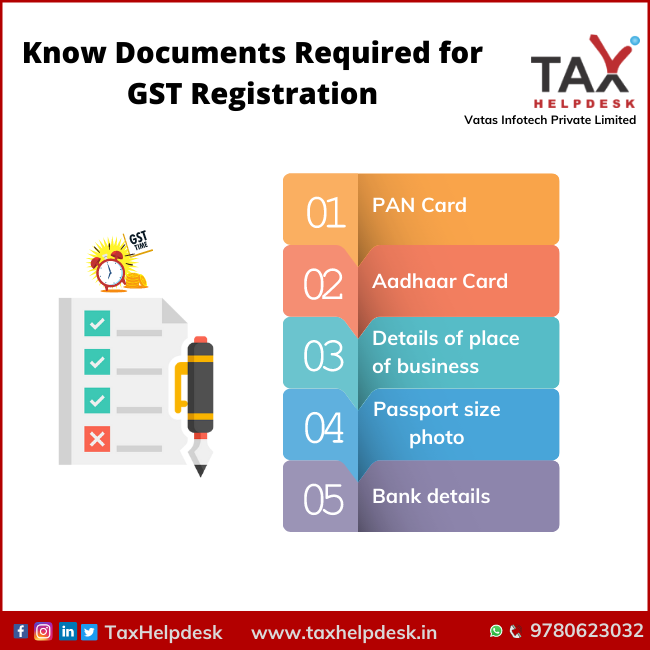Taking Full Advantage Of Tax Efficiency: Expert Tips on Browsing the GST Registration Labyrinth for Small Companies
Browsing the elaborate landscape of Item and Services Tax Obligation (GST) enrollment can be a labyrinthine task for tiny services aiming to optimize their tax obligation performance. In this conversation, we will check out skilled understandings and workable recommendations that can encourage tiny services to browse the GST registration maze properly and enhance their tax performance.
Eligibility Criteria
Eligibility needs for Small company GST Enrollment encompass certain standards that services need to fulfill to adhere to tax obligation policies. To get GST enrollment, an organization has to have an annual turn over exceeding the threshold set by the tax obligation authorities, which varies by country. Furthermore, companies involved in inter-state supply of goods or services, or those offering items online, might be required to register for GST, regardless of their turnover. It is important for organizations to accurately identify their eligibility based on these turn over limits to prevent fines for non-compliance. Singapore GST Registration.
.jpg)
Paperwork Needs
The called for paperwork commonly includes evidence of organization registration or identity, consolidation and address proofs of the company owner, pictures, financial institution account details, and proof of the principal location of company. Furthermore, businesses need to give information of their company activities, including the products or solutions provided.
Maintaining all required documents organized and conveniently obtainable can simplify the enrollment procedure and help businesses conform with the requirements efficiently. Careful attention to information and adherence to the documents guidelines are vital for a successful GST enrollment process for little businesses.
Timing Considerations
Thinking about the vital documentation needs have actually been thoroughly dealt with, the following important element for little services starting the GST registration process is the calculated management of timing considerations. Timing plays a critical function in GST enrollment, influencing not just compliance but likewise economic aspects of business. Small services require to thoroughly plan the timing of their GST registration to make best use of advantages and reduce potential threats.

In addition, services need to straighten the timing of their GST enrollment with their functional readiness. Sufficient preparation, such as updating audit systems and training team, is necessary to perfectly incorporate GST needs right into day-to-day operations. By purposefully taking care of timing factors to consider, local business can browse the GST registration process efficiently and enhance their tax effectiveness.
Registration Refine Tips
Successfully browsing the GST enrollment process calls for local business to implement critical and proactive registration process suggestions. One crucial tip is to guarantee all needed records are easily offered before starting the registration procedure. This consists of company enrollment records, evidence of address, bank statements, and recognition proofs of business proprietors. Confirming the precision of the information given is just as important to avoid denials or hold-ups.
In addition, understanding the thresholds and demands for GST registration based upon the particular state or area where business operates is essential. Some states have different turnover thresholds that activate compulsory enrollment, so being notified about these thresholds can assist services prepare in advance.
One more beneficial idea is to take into consideration looking for expert assistance from accountants or tax consultants that focus on GST enrollment. Their experience this can enhance the procedure, reduce errors, and guarantee compliance with all laws.
Conformity Finest Practices
Little businesses should focus on conformity to avoid fines and keep a good standing with tax obligation authorities. Tiny service proprietors ought to consistently assess government guidelines and look for specialist guidance if needed to guarantee they are fulfilling all needs. By incorporating these conformity ideal techniques into their operations, small companies can navigate the intricacies of GST enrollment with self-confidence and performance.
Verdict
In conclusion, little services can browse the GST enrollment puzzle by guaranteeing they fulfill qualification standards, collect called for documentation, consider timing ramifications, comply with enrollment procedure pointers, and comply with compliance best practices. By making the most of tax obligation performance through appropriate GST registration, organizations can enhance their financial administration and procedures.
Browsing the detailed landscape of Goods and Solutions Tax (GST) registration can be a labyrinthine job for tiny organizations aiming to maximize their tax efficiency.Eligibility needs for Small Company GST Registration encompass particular requirements that organizations must satisfy to conform with tax obligation laws. The needed paperwork generally includes proof of business registration or address, consolidation and identification evidence of the company proprietor, photos, bank account information, and proof of the primary place of organization. Additionally, organizations require to provide information of their service tasks, including here are the findings the services or items supplied.Efficiently navigating the GST enrollment process calls for small organizations to carry out strategic and positive enrollment process ideas.